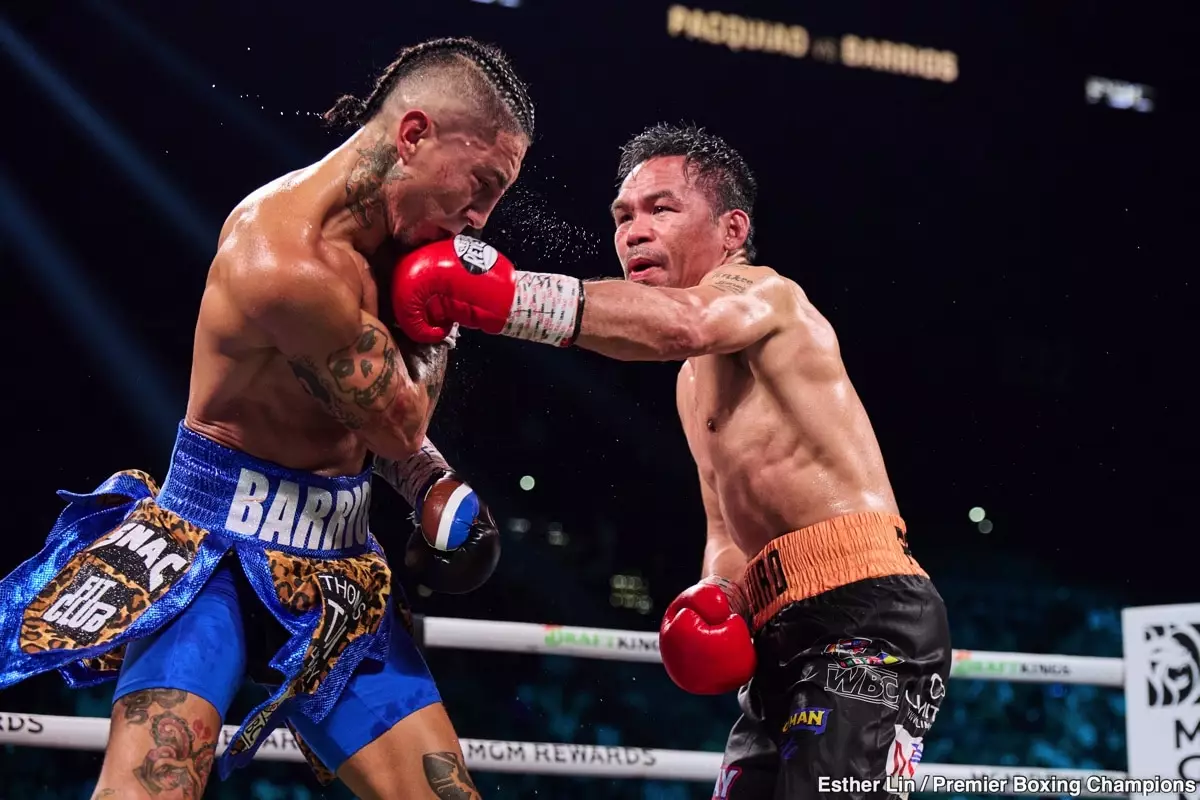Manny Pacquiao’s recent performance in the fight against Mario Barrios serves as a compelling reminder that greatness defies time and skepticism. At the age of 46, the boxing world doubted whether Pacquiao could still contend at the highest level, especially against a younger, physically formidable opponent. Yet, Pacquiao’s display of grit, skill, and tactical ingenuity shattered those doubts. Although the official decision was ruled a draw—an outcome that many fans and analysts felt was a miscarriage of justice—the narrative surrounding Pacquiao’s resilience has only grown stronger. To dismiss his performance purely based on the official verdict is to ignore the indelible mark he continues to leave on the sport.
What Pacquiao demonstrated was not just longevity, but an unwavering spirit that refuses to bow to the natural progression of aging. His ability to adapt, to fight with a combination of speed, experience, and cerebral strategy, underscores why he remains a relevant figure in boxing even after decades of distinguished competition. It’s a testament to his character that critics and fans alike are reflecting on his career with more admiration—even if the result of this match leaves some debate over the outcome. Pacquiao’s showing reminds us that true champions are measured not solely by titles or official decisions but by their capacity to inspire and challenge perceptions of what is possible.
Evaluating Mario Barrios and the Critical Voice of Malignaggi
The aftermath of the fight prominently features strong opinions—particularly from former two-weight champion Paulie Malignaggi, who did not hold back in his critique of Barrios. Calling him “horrible” and perhaps the “worst champion” he’s ever seen, Malignaggi’s blunt assessment raises uncomfortable questions about Barrios’ skills and mentality. Is this critique too harsh? Or is it a genuine reflection of what transpired inside the ring? Malignaggi’s judgment is rooted in observing a fighter who, despite claiming to fight with a “kill or be killed” mentality, approached a legendary boxer with excessive respect and caution.
Barrios’ own pre-fight bravado—claiming he studied Juan Manuel Marquez’s knockout and could emulate it—further heightens expectations that he would engage aggressively. Instead, what we saw was a timid approach, akin to a sparring match rather than an all-out war. The comments from Abel Sanchez, emphasizing Barrios’ lack of aggression and proper game plan, only reinforce the notion that Barrios didn’t capitalize on his physical tools or mental preparedness. A champion’s attitude—aggressive, fearless, and strategic—is crucial at this level. Barrios fell short of these qualities, and that failure significantly diminishes his standing.
Given this performance and the harsh opinions surrounding him, the question arises: does he deserve another shot at Pacquiao? Most critics, including Malignaggi, believe that he does not. The perception is that Barrios’ boxing skills and championship mentality are lacking, which makes pressing for another high-profile bout seem misplaced. If we’re honest, his performance was underwhelming and failed to showcase the qualities expected from a titleholder. It raises the broader issue of what truly constitutes a deserving contender — is it just a belt, or the demonstrated ability to challenge a legend meaningfully?
The Future of Pacquiao: Who Deserves the Next Shot?
As Pacquiao’s story continues to unfold, fans are left pondering who he should face next. The options are tempting but complex: a rematch with Barrios, a showdown with Rolly Romero, or even a lucrative trilogy with Floyd Mayweather. Each path carries its own set of expectations and implications for Pacquiao’s legacy, and opinions vary widely.
A rematch with Barrios seems unlikely to do justice to Pacquiao’s greatness, especially after a performance that suggested the opponent lacks the necessary qualities to make a compelling fight. Romero presents a more intriguing prospect—an energetic boxer with a name that could draw significant pay-per-view numbers. Meanwhile, a rematch with Mayweather remains the gold standard for many fans seeking the ultimate payoff, albeit one that’s more about spectacle than competitive necessity.
From my perspective, Pacquiao’s true strength lies in choosing opponents who challenge him physically and mentally—fighters who test his craft and push his limits. Engaging with Romero or even exploring a carefully crafted rematch that rekindles the competitive fire could serve his legacy better than a bland, predictable rematch with Barrios. Pacquiao’s career proves that he operates best when motivated by worthy adversaries, not just the monetary allure of a big fight.
In the end, Pacquiao’s greatness transcends any one opponent or verdict. It’s embedded in his relentless pursuit of excellence and his capacity to inspire millions by defying age and expectation. The next chapter should reaffirm his status not just as a fighter, but as a true icon who defined an era and continues to challenge the limitations of his own legend.

